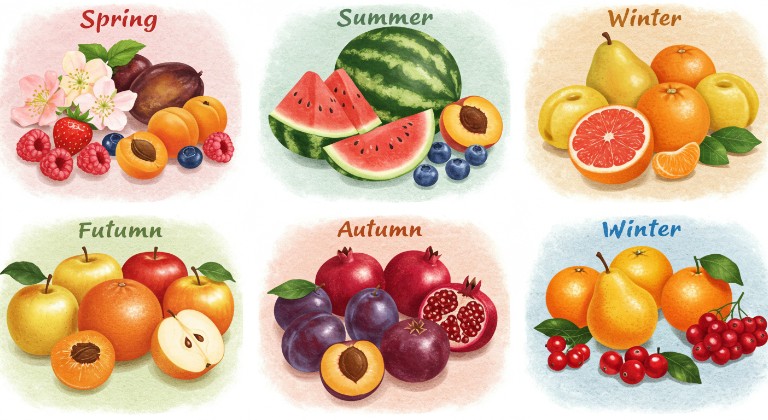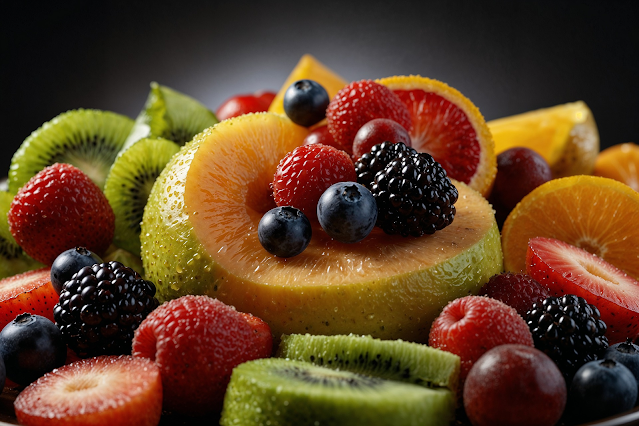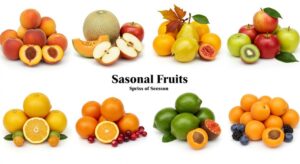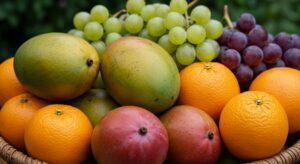Introduction
When was the last time you savored a juicy peach in the summer or crunched into a crisp apple during fall? Seasonal fruits aren’t just nature’s way of showing off; they’re a powerhouse of flavor, nutrients, and benefits for you and the environment. By eating seasonally, you’re not only treating your taste buds but also embracing a lifestyle that’s kinder to your health, your wallet, and the planet.
Table of Contents
Why Choose Seasonal Fruits?
Eating seasonal fruits means consuming produce at its natural peak. This doesn’t just enhance the flavor but also maximizes the nutrients you’re getting. Let’s delve deeper into why seasonal fruits should be your go-to choice:
- Health Benefits of Seasonal Fruits
- Seasonal fruits are harvested when fully ripe, which means they retain more vitamins and minerals. For instance, summer berries are packed with antioxidants that protect your cells from damage, while winter citrus fruits are bursting with immune-boosting vitamin C.
- Higher Nutritional Value
- Non-seasonal fruits often travel long distances and are harvested early to survive shipping. This process can lead to nutrient loss. Eating fruits in season ensures you’re getting the maximum health benefits they offer.
- Support for the Environment
- Seasonal eating reduces the carbon footprint. Local produce requires less transportation and storage, making it a more sustainable choice. Plus, supporting local farmers boosts the economy in your region.
Seasonal Fruits for Every Season
Eating seasonally means enjoying what’s fresh and flavorful throughout the year. Here’s a quick guide to what’s in season:
Spring
- Examples: Strawberries, apricots, cherries
- Benefits: Rich in antioxidants, these fruits help flush out toxins and rejuvenate your skin.
Summer
- Examples: Watermelon, peaches, berries
- Benefits: These hydrating fruits keep you cool and provide essential vitamins like A and C.
Fall
- Examples: Apples, pears, persimmons
- Benefits: High in fiber, fall fruits aid digestion and keep you feeling full longer.
Winter
- Examples: Oranges, grapefruit, pomegranates
- Benefits: Loaded with vitamin C, they help boost your immune system during the colder months.
Nutritional Comparison of Seasonal Fruits
| Season | Fruit Examples | Key Nutrients | Health Benefits |
|---|---|---|---|
| Spring | Strawberries, Cherries | Vitamin C, Antioxidants | Detoxifies the body, promotes skin health |
| Summer | Watermelon, Peaches | Vitamin A, Vitamin C | Hydrates the body, supports immune function |
| Fall | Apples, Pears | Fiber, Potassium | Aids digestion, supports heart health |
| Winter | Oranges, Pomegranates | Vitamin C, Polyphenols | Boosts immunity, reduces inflammation |

Budget-Friendly and Healthy
Did you know eating seasonal fruits can save you money? Since these fruits are abundant during their peak season, they’re often more affordable. Here’s how you can make the most out of seasonal eating:
- Shop at Farmers’ Markets
- Local markets offer fresh produce at reasonable prices. They’re also a great way to discover what’s in season in your area.
- Learn How to Store Fruits
- Proper storage helps extend the shelf life of fresh produce. For instance, berries should be refrigerated and eaten within a few days, while apples can last weeks if stored in a cool, dry place.
Creative Ways to Enjoy Seasonal Fruits
Incorporating seasonal fruits into your meals doesn’t have to be boring. Here are some fun ideas:
- Seasonal Smoothies
- Blend summer fruits like mangoes and peaches with yogurt for a refreshing treat.
- Fruit Salads
- Mix spring strawberries with spinach and goat cheese for a sweet-savory delight.
- Desserts
- Bake fall apples with cinnamon and a drizzle of honey for a guilt-free dessert.
Addressing Common Concerns
- Are non-seasonal fruits harmful?
- While imported or out-of-season fruits aren’t harmful, they often lack the flavor and nutrients of their seasonal counterparts.
- Frozen vs. Fresh Seasonal Fruits
- Freezing locks in nutrients, making frozen fruits a great alternative when fresh options aren’t available. However, always check for added sugars in packaged frozen fruits.
Conclusion: Embrace the Season!
Seasonal fruits offer a simple, delicious way to enhance your diet while supporting your health and the planet. So, next time you’re at the store or farmers’ market, take a moment to choose what’s in season. Not only will you enjoy fresher, tastier produce, but you’ll also reap the benefits of a healthier and more sustainable lifestyle.
Call to Action: Start your seasonal eating journey today! Explore local farmers’ markets, try out new recipes, Let’s savor the seasons together!




